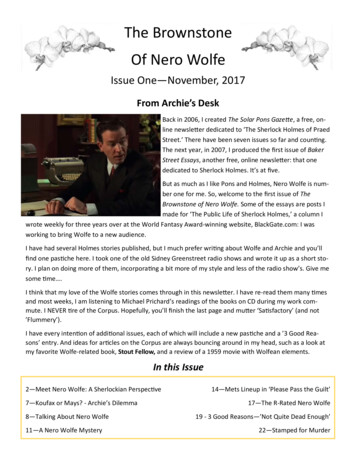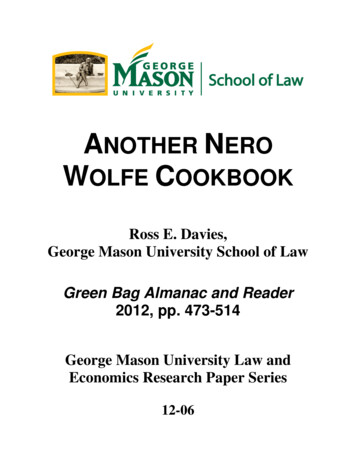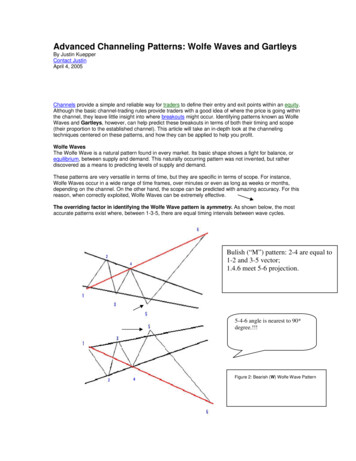
Transcription
The BrownstoneOf Nero WolfeIssue One—November, 2017From Archie’s DeskBack in 2006, I created The Solar Pons GazeƩe, a free, on‐line newsle er dedicated to ‘The Sherlock Holmes of PraedStreet.’ There have been seven issues so far and coun ng.The next year, in 2007, I produced the first issue of BakerStreet Essays, another free, online newsle er: that onededicated to Sherlock Holmes. It’s at five.But as much as I like Pons and Holmes, Nero Wolfe is num‐ber one for me. So, welcome to the first issue of TheBrownstone of Nero Wolfe. Some of the essays are posts Imade for ‘The Public Life of Sherlock Holmes,’ a column Iwrote weekly for three years over at the World Fantasy Award‐winning website, BlackGate.com: I wasworking to bring Wolfe to a new audience.I have had several Holmes stories published, but I much prefer wri ng about Wolfe and Archie and you’llfind one pas che here. I took one of the old Sidney Greenstreet radio shows and wrote it up as a short sto‐ry. I plan on doing more of them, incorpora ng a bit more of my style and less of the radio show’s. Give mesome me .I think that my love of the Wolfe stories comes through in this newsle er. I have re‐read them many mesand most weeks, I am listening to Michael Prichard’s readings of the books on CD during my work com‐mute. I NEVER re of the Corpus. Hopefully, you’ll finish the last page and mu er ‘Sa sfactory’ (and not’Flummery’).I have every inten on of addi onal issues, each of which will include a new pas che and a ’3 Good Rea‐sons’ entry. And ideas for ar cles on the Corpus are always bouncing around in my head, such as a look atmy favorite Wolfe‐related book, Stout Fellow, and a review of a 1959 movie with Wolfean elements.In this Issue2—Meet Nero Wolfe: A Sherlockian Perspec ve7—Koufax or Mays? ‐ Archie’s Dilemma8—Talking About Nero Wolfe11—A Nero Wolfe Mystery14—Mets Lineup in ‘Please Pass the Guilt’17—The R‐Rated Nero Wolfe19 ‐ 3 Good Reasons—’Not Quite Dead Enough’22—Stamped for Murder
Meet Nero Wolfe: A Sherlockian Perspec veReaders (unknowingly) said goodbye to Sherlock Holmes in 1926’s “The Adventure of the Re red Colour‐man.” Only eight years later, a new detec ve who would not only evoke memories of the Holmes storiesbut also plough new ground arrived in the (oversized) form of Nero Wolfe. The seventy‐four stories,wri en over forty‐one years, would be collec vely known as the Corpus, akin to the Sherlockian Canon.For those unfamiliar with the stories, Nero Wolfe lives ina brownstone townhouse in New York City with ArchieGoodwin, Fritz Brenner and Theodore Horstmann. This isa boy’s club: no girls allowed (although Archie’s roman cinterest, Lily Rowan, holds a special status). Wolfe’s a ‐tude towards females makes Holmes appear to be a“whole‐souled admirer of womankind.” Quiz: Can youiden fy the Holmes tale that phrase is from? Answer atthe ar cle’s end.They are a self‐contained unit, with Wolfe and Archiesolving crimes, Fritz cooking and taking care of the house‐hold chores and Horstmann assis ng Wolfe with his hob‐by, the cul va on of orchids in a roo op greenhouse.Archie o en comments on the beauty of the orchids, which is a far cry from the thoughts of General Stern‐wood in Raymond Chandler’s The Big Sleep: “Nasty things. Their flesh is too much like the flesh of men,and their perfume has the ro en sweetness of corrup on.” Po‐tay‐toe, po‐tah‐toe, I guess.Because the characters do not age, the stories all have a comfortable familiarity about them. Also, they areset contemporary to their wri ng, so while in a Holmes tale it is ‘always 1895’, the Wolfe stories feel muchmore like modern mysteries, even though some are over eighty years old.The Wolfe adventures are great reads on their own merits, but the Sherlockian, using those famous pow‐ers of observa on, can detect elements of the Canon throughout the Corpus.No, You Mean My BrotherNero Wolfe bears a much stronger resemblance to Mycro Holmes than to his more famous brother,Sherlock. Archie frequently tells us that Wolfe is lazy, and in fact his boss prefers to takes cases only whenfinancial necessity dictates. Archie tells us that one of his most important jobs it to browbeat Wolfe intoworking, which is certainly indica ve of the la er’s a tude to‐wards accep ng clients.Sherlock Holmes says that his brother would rather be consid‐ered wrong than to exert the necessary energy to prove himselfcorrect. Wolfe may not quite take things that far, but he will dohis utmost to avoid taking on a case. He once said, “I am not in‐terested, not involved and not curious.” Unless forced by circum‐stances, that pre y much sums up Wolfe’s a tude to work.Physically, Mycro is described by Watson as ‘corpulent,’ whichmeans having a large, bulky body. Wolfe actually uses the word‘gargantuan’ to describe himself, and while his weight variesover the years, under normal circumstances it is in the neighbor‐
hood of 285 pounds. Both Wolfe and Mycro are very large men, but with extremely agile minds. One thinksof Sidney Greenstreet’s ‘The Fat Man’ in The Maltese Falcon. In fact, Greenstreet actually voiced Wolfe in aseries of radio plays star ng in 1950 (see page 9).In Fer de Lance, the very first story, Wolfe is unfamiliar with the sport of golf. He has some clubs brought tohis office and asks the delivery boy to demonstrate them for him. A er watching a powerful swing, Wolfemu ers “Ungovernable fury.” Only a man who detests unnecessary physical exer on would view a simplegolf swing in that vein.Wolfe considered venturing outside the brownstone as some‐thing to be avoided in the extreme, with only three events reg‐ularly drawing him forth: vo ng, dining at Rustermans, (therestaurant owned by his boyhood friend Marko Vukcik), andpursuing his orchid obsession. Other sallies forth were dictatedby circumstances and universally disliked. Wolfe viewed ridingin a car akin to a suicide mission. One wonders how he man‐aged to get to Montana in Death of a Dude. He was a tudewas laughable while taking a train from New York City to WestVirginia in Too Many Cooks.Both Wolfe and Mycro are men of habits. Six days a week,Wolfe takes breakfast in his room, dresses in exactly the samefashion , spends two hours in the morning and two more inthe a ernoon upstairs in the plant rooms, has lunch and din‐ner in the dining room at set mes and only deals with business ma ers in the office if he absolutely must.When Wolfe enters the office for the first me, he greets Archie with a “Good morning,” even if they havealready spoken. Fritz must not open the beer bo les he brings to Wolfe, who does it himself, using a specificbo le opener each me. Few detec ves follow as rigid a daily pa ern as Wolfe.Mycro ‘has his rails’ and only frequents three places: his lodgings, his government office and the DiogenesClub. Holmes wonders what upheaval could have unse led Mycro ’s habits so much to force a visit BakerStreet. He compares it to a planet leaving its orbit.“Give me your details, and from an armchair I will return you an ex‐cellent expert opinion. But to run here and run there. it is not mymé er.” Though this was Mycro himself, talking to Sherlock, it couldvery well have been Wolfe talking to Archie. But similari es are notlimited to only Mycro .Moriarty? No, Zeck.Professor James Moriarty was Sherlock Holmes’ great nemesis. Thedetec ve got the be er of Dr. Grimesby Roylo , Charles AugustusMilverton, John Clay and many others, but it is Moriarty who is THEvillain in the Canon.There is only one adversary who appears in mul ple stories in theCorpus, and he is clearly the most dangerous man Wolfe faces. Threemes Wolfe comes into contact with Arnold Zeck, who, like Moriarty,is the head of a criminal organiza on. Also like Moriarty, Zeck tries towarn the detec ve to stay out of his business. Failing, he has Wolfe’sgreenhouse destroyed with a barrage of machine gun fire. Later, hesends a tear gas bomb to Wolfe’s office. Just as Holmes fled 221B
Baker Street, Wolfe simply abandons the brownstone and goes deep undercover: Archie doesn’t even knowwhere he is.Holmes stayed in hiding un l the opportunity arose to get Moriarty’s chief lieutenant, Colonel Moran. Wolfeengaged in a similar ploy, slowly, anonymously, working his way into Zeck’s organiza on. When the ming isright, Wolfe sets a trap for his foe, just as Holmes did for Moran.War ServiceDuring World War I,Holmes came out of re‐rement to go under‐cover and break up aGerman spy ring. InWorld War II, NeroWolfe essen ally setsaside his private prac‐ce and works for theArmy. In Booby Trap wewatch Wolfe and Archiesolve a war me indus‐trial espionage casefraught with murder.Wolfe and the Holmesbrothers are both great patriots and serve their respec ve countries. Archie (pictured above) actually leavesWolfe’s employ to enlist in the army and quickly becomes a major.Archie!It can be argued that Sherlock Holmes would have done just fine withoutWatson (I think so). While the good doctor was a more than capable chron‐icler, Holmes could probably have completed his inves ga ons withoutWatson. Things might have been more difficult, but a successful conclusionwould likely have been reached, nonetheless. This is par ally becauseHolmes was a very energe c and physically capable detec ve.Nero Wolfe most certainly is not. Archie does all of the legwork. Well, notquite all; he does have assistance some mes. However, Wolfe, quite simp‐ly, does not inves gate. He thinks and he issues orders. Archie is a far morecapable sidekick than Watson. He is, in fact, a licensed private inves gatorin his own right. When Wolfe disappears as part of his campaign againstArnold Zeck, Archie sets up shop on his own and does quite well.Archie is brave, wise‐cracking, a rac ve to women, athle c and tough. Heis a detec ve in the style of Sam Spade and gumshoes in the pages of BlackMask Magazine. In fact, Wolfe is an intellectual detec ve in the Sherlock/Mycro era, while Archie is typical of the hard boiled genre. Thus, RexStout created a detec ve series that was characterized by the two periodsof detec ve fic on which bookended the Golden Era of mystery stories (ofwhich Agatha Chris e is a prime example).
Perhaps it’s in the Blood?Sherlockians have o speculated that there was a roman c rela on‐ship between Sherlock Holmes and Irene Adler, with several filmsand pas ches u lizing the premise. John Lescroart wrote a pair ofnovels featuring Auguste Lupa (a name with linguis c connota onsof Nero Wolfe), Son of Holmes and RaspuƟn’s Revenge. The brilliantLupa is the offspring of Holmes and Adler. Though it is never overtlystated, it’s hard not to conclude that Lupa, who heads off to Americawith his Swiss chef, Fritz, at the end of the second novel, becomesNero Wolfe. In fact, it’s elementary. There will be an essay in thesecond issue of The Brownstone that iden fies all the Wolfean andSherlockian references in Son of Holmes (beyond the tle!).Now, don’t get the impression that the Wolfe stories are just palecopies of the Holmes tales. Rex Stout excelled in both dialogue andcharacteriza on (his plots can fairly be cri cized) and the Wolfe sto‐ries hold a unique and enduring place in the mystery pantheon. ButStout was a well known fan of Sherlock Holmes and traces of thatadmira on and respect for the world’s first and greatest private con‐sul ng detec ve can be found in the Corpus.Beyond StoutUnlike Sherlock Holmes, Nero Wolfe is s ll copyright protected, so you won’t find a plethora of pas ches(There’s a good name for a mystery story) for sale in bookstores andonline. However, if you’ve worked through the Corpus a few mesand want more, there are s ll some op ons out there.Robert Goldsborough, with permission from the Stout Estate, pub‐lished seven novels featuring Wolfe and Archie between 1986 and1994. Like Stout’s originals, they are contemporary tales and the lastbook in this run, The Missing Chapter, pokes fun at pas ches of popu‐lar series’. Goldbsorough returned to the Brownstone in 2012 withArchie Meets Nero Wolfe and has wri en a total of twelve Wolfetales so far.Lawrence Block created Leo Haig, star of two novels and several shortstories. Haig has learned everything that he can about Nero Wolfe,who he believes to be a very real person: Rex Stout is merely a pseu‐donym. He lives as a shadow of Wolfe, keeping tropical fish instead oforchids, venturing out for business only when he has to and employ‐ing his own Archie, Chip Harrison, to do the legwork. Haig’s dream isto be invited to dinner at Wolfe’s brownstone, which is a clever bit.‘The R‐Rated Wolfe’ on page 17, is about Haig and Harrison.H Paul Jeffers, who includes two Sherlock Holmes tles among his list of works, wrote three books featuringSergeant John Bogdanovic. The policeman finds himself immersed in the world of a famous fic onal detec vein each novel. The third, en tled Corpus Corpus, centers around an annual Wolfe Pack Dinner. As expected,Wolfean details abound throughout the tale.
Finally, in 2008, Loren Estleman began a series of pas ches featuring amateur private detec ve ClaudiusLyon, whose life mission is to emulate Nero Wolfe. Lyon’s Archie is an ex‐convict named Arnie Woodbine,who also serves as narrator. Estleman has long been known to Sherlock Holmes fans for two solid pas ches,one featuring Dracula and the other Dr. Jekyll and Mr. Hyde. The stories were collected together in 2017 asNearly Nero: The Adventures of Claudius Lyon, the Man Who Would Be Wolfe.Very Sa sfactoryIf you have only a passing acquaintance with Nero Wolfe, you would do well to read up on the Corpus. Forthe more visually‐minded mystery lover, there is also a superb Nero Wolfe series available on DVD. It airedon the A&E network in 2001 and 2002 and features Maury Chaykin and Timothy Hu on. Hu on, in par cular,excelled, also serving as director and execu ve producer on the series. It is a high‐quality produc on with anexcellent jazz soundtrack and happily, is quite faithful to the original stories. And you can read it about it onpage 11. in 2017, an earlier Wolfe series, starring William Conrad, was released on DVD. It has some goodpoints, but the A&E series is superior.Quiz Answer: Holmes tells Watson that he is NOT such an admirer of women in the fourth and final novel,The Valley of Fear.Aus n Briggs for “Frame Up For Murder” in The Saturday Evening Post
Koufax or Mays? ‐ Archie’s DilemmaIn Death of a Doxy, Archie is at Lily Rowan’s penthouse, listening to a poet read a self‐dubbed ‘epithon:’ socalled because it was epic and took hours to read. Add in that the man wrote it himself and you’ve got theidea. Archie was rescued by a phone call from Wolfe, and when the call came, he had been leaning back withhis eyes closed, deba ng on whether he would choose Sandy Koufax or Willie Mays. Which is a good ques‐on.He con nued pondering the dilemma and by the me hedropped the car off at the garage, he had decided on Mays be‐cause “Koufax’s arm was too much of a gamble.” The book waspublished in August of 1966. That was Koufax’ amazing finalyear, in which he went 27‐9 with a 1.73 ERA, 27 completegames and 317 strikeouts (he won the Pitcher’s Triple Crownthat year).That same year, Mays made his last run at an MVP award (hefinished third), ba ng .288 with 37 homers and 103 RBIs.Those were down numbers for Mays, and he wouldn’t matchthem in the remaining seven years of his career.Archie was right: Koufax, not wishing to risk permanent damage to his elbow, stunned the baseball world byre ring a er the 1966 World Series: leaving as the best pitcher on the planet and nicknamed ‘The Le Armof God.’Mays never managed to hit higher than .291 and only once smacked more than 23 homers before re ring.So, you could say that neither man contributed to his Hall of Fame resume a er Archie made his call. Howev‐er, both were in their prime from 1962 through 1966, so I prefer tothink that the story actually took place during that period and it wasa legi mate ques on. Especially since Mays was 5 years older thanKoufax in 1966.And while Koufax (pitcher) and Mays (player) remain two of the ‘all‐me greatest’ candidates, Koufax’ arm was certainly a worry and itended his career just as Archie thought it might.“I can’t believe that Babe Ruth was a beƩer player than Willie Mays. Ruth is probably to baseballwhat Arnold Palmer is to golf. He got the gamemoving. But I can’t believe he could run as well asMays, and I can’t believe he was any beƩer as anouƞielder.” - Sandy Koufax
Talking About Nero WolfeIn “Who Needs a Hard Boiled Detec ve?” which appeared at BlackGate.com in September of 2015, I lookedat how, during the rise, rule and decline of the American hard‐boiled school of fic on, August Derleth waswri ng Solar Pons stories that were pure throwbacks to the Victorian Era mysteries of Sherlock Holmes. I’dsay more, but you already either know it or should go read my essay if you haven’t!And the following excerpt is from the ini al version of “Hard Boiled Holmes,” an essay I wrote tracing theroots of the American hard boiled school back to Victorian London and Holmes:Rex Stout created Nero Wolfe in 1934 and the last story was published in 1975, shortly before theauthor’s death. Fortunately, there were over seventy Wolfe tales in between. Stout created a synthesis of Holmes and the hard boiled school that has yet to be surpassed.Nero Wolfe was a brilliant, disagreeable and incurably lazy detecƟve. He seems very much to be asuccessor to MycroŌ Holmes, with a bit of Sherlock thrown in. His chronicler and assistant wasthe smooth talking tough guy, Archie Goodwin.Goodwin himself stacks up with the best of the hard-boiled private eyes. To over-simplify, Stoutpaired MycroŌ/Sherlock Holmes with Sam Spade. Two characters, represenƟng the Doylean andhard-boiled approaches, worked together in each story. This characterisƟc is probably one of theprimary reasons that the Wolfe books have enjoyed so much success over three-quarters of a century.I’ve seen it asserted more than once that it’s not the plots that are atthe root of the success of the Nero Wolfe stories. That’s a reasonablestatement. We return to the tales me and again for the characters ofArchie and Wolfe. Of course, we look forward to Fritz, InspectorCramer, Inspector Rowcliff and the rela onships between all the char‐acters that come, go and live at the famous brownstone on 35thStreet. But the Corpus is about Archie and Wolfe and what they do onthe page.And as I indicated above, the two represent a superb synthesis of thebrilliant armchair reasoner and the tough, wisecracking private eye. IfWolfe went out and about on cases, his character would overlap withArchie’s, regardless of their differences. But Stout shrewdly split thenecessi es of a successful detec ve into two garments and drapedthem on two different private inves gators.THE MEDIA WOLFEI was a latecomer to Wolfe, actually discovering him through the A&E television series from 2000‐2001. Fartoo short‐lived, Maury Chaykin (Wolfe) and Timothy Hu on (Archie) starred in an excellent (and faithful) ad‐apta on of the original stories. You can read my thoughts on that show on page 11, but to summarize: It is anexcellent series and I am s ll re‐watching episodes. I really wish it had held on for at least one more year andgiven us more episodes.
There had been a prior television series with Wil‐liam Conrad (Cannon) and Lee Horsely (MaƩHouston, PI), set in the seven es and it was re‐leased this year on DVD. Thayer David actuallystarred as Wolfe in the pilot, but then passedaway, pu ng the series on hiatus for four years,at which me Conrad and Horsely took centerstage.There had also been a pair of big screen moviesin 1936 and 1937 that Rex Stout so disliked, henever let Hollywood touch Wolfe again duringhis life me!An alterna ve I cannot recommend highly enough is Michael Prichard’s audio book readings of the originalstories. I have nearly two dozen and they are fantas c. They’re a regular part of my work commute and I’velistened to each at least three mes. Great readings of great stories: how could you get red of them?But all of this media palaver from me is really just a lead‐in to a look at Wolfe radio shows: primarily one ofthem.There were three radio series’ in the for es and fi ies. The first, The Adventures of Nero Wolfe, lasted 51 ep‐isodes in 1943 and 1944 and featured three different Wolfes: J.B. Williams, Santos Ortega and Luis VanRooten. It didn’t draw on Stout’s stories at all (Louis Vi es scripted the show) and you can listen to the onlyknown exis ng episode, The Last Laugh Murder (believed to feature Ortega).The second, The Amazing Nero Wolfe, lasted only 21episodes in 1945 and starred Francis X. Bushman. Again,the stories were originals and scripted by Vi es oncemore. Click here for The Shakespeare Porƞolio.The third, The New Adventures of Nero Wolfe, is by farthe best known. Las ng only six months and covering 26episodes, it starred Sydney Greenstreet as Wolfe. Ofcourse, The Maltese Falcon’s ‘The Fat Man’ certainlylooked the part. Quite a few folks like Greenstreet andalmost every episode has survived and is available onthe Internet. I’m slowly warming up to this series, butI’m not yet quite on totally sold.Greenstreet sounds like Caspar Gutman pretending tobe Nero Wolfe. Greenstreet’s Wolfe doesn’t at all soundlike what I imagined. Unfortunately, they ran throughsix Archies. Regardless of who it is, this Goodwin is ab‐solutely girl‐crazy. In that regard, he actually comesacross as a parody of Stout’s crea on. It’s a varia on onthe ‘Watson is a doofus’ problem.So, you’ve got a Wolfe who blusters far too much and a
libido‐driven Goodwin who constantly annoys Wolfe about the bank balance. I don’t find either character tobe the embodiment of what Stout actually wrote.This show marked the end of Wolfe on the radio for over three decades. Then, in 1982, The Canadian Broad‐cas ng Corp produced 13 episodes with Maver Moore (Wolfe) and Don Francs (Archie), all based on Stout’sstories. Moore plays Wolfe in the Greenstreet mode (see above), while Francs seems to be the most authen‐c Goodwin we’ve yet go en on radio. The series had a soundtrack that veered between kind of neat jazzand eigh es porn stylings. Its greatest strength is that the stories are directly from Stout, and that’s worthquite a bit. The site I used to listen to it on is gone, but I know the episodes are s ll somewhere online. You’llhave to look a bit.Wolfe has also appeared in Italy, West Germany and Russia, but those are countries for another day. Also,Robert Goldsborough is wri ng authorized sequels; seven books between 1986 and 1994. I think overall, hedid a nice job and I recommend them. A er an eighteen‐year hiatus, he returned to the brownstone in 2012,adding five more to the originals for a dozen and coun ng. So far, they newer books have not yet been up tothe standards of his earlier novels.I like Sherlock Holmes, I know my Solar Pons and I enjoy watching David Suchet’s Hercule Poirot, but NeroWolfe is the first and foremost detec ve for me.‘In 1934, Rex Stout introduced Nero Wolfe and Archie Goodwin, apair that blended the hard boiled private eye with the armchairgenius best personified by MycroŌ Holmes.Stout was a well known Sherlockian and the Holmes stories exerted a great influence on the Wolfe books, which remain populartoday. However, Stout was astute enough to know that pulp magazines set the style of American detecƟve ficƟon and Wolfe andGoodwin very much read like contemporary mysteries, not throwbacks to gas lit London.’‐ from my essay, August Derleth & Solar Pons—Who Needs aHardboiled Detec ve?
A Nero Wolfe Mystery (A&E)In early 2000, A&E aired a one‐off movie, The Golden Spiders. It starred Canadian Maury Chaykin as RexStout’s famous detec ve, Nero Wolfe, and Timothy Hu on as his man Friday, Archie Goodwin. Reviews wereposi ve and a year later, the first of an eleven‐episode series aired, The Doorbell Rang.Sixteen more episodes came in 2002, of whichfour were two‐parters (there had been threelong‐players the prior year). The show was inde‐pendently produced and par ally subsidized byA&E. But reportedly costs rose to a million dol‐lars an episode and the show was, sadly, nay,tragically, cancelled a er the second season.I remember the late Maury Chaykin (he passedaway in 2010) as the self‐respec ng southernerwho didn’t use instant grits in My Cousin Vinny.But he was a very good Wolfe. Large but notobese, he had Wolfe’s command of words andinflec on. He seemed to yell more than the Wolfe of the books, but that’s not really a flaw in a television por‐trayal of the detec ve. I’ve seen interviews that indicate he didn’t par cularly enjoy playing the character,but that certainly didn’t come through. I think he’s easily the best Wolfe I’ve seen so far.Timothy Hu on brought the star power to the show as the wise‐cracking Archie Goodwin and he later di‐rected and produced. His New York accent isn’t quite right for the Ohio na ve, but he plays the part well. Ithink I actually prefer Lee Horsley in the seven es series starring William Conrad as Wolfe, but Hu on s lldelivers a fine performance. And a lot of fans I know think he was right on the money, so it’s minor quibbling.The rela onship between Wolfe and Archie is, to me, the heart of the series. And Chaykin and Hu on do asuperb job of pulling it off. When Archie tears up his paycheck a er a snippy comment from Wolfe in Prison‐er’s Base, it’s exactly how I read it.The way the two actors play theircharacters and interact is one of thefounda ons of the show’s success andit never falters.Bill Smitrovich is THE InspectorCramer. When I’m wri ng Wolfe sto‐ries, it’s Smitrovich I see and hear asthe words go down on the page. Hisscenes are usually among my favoritesin an episode. Colin Fox is a solid Fritz,though his scenes are usually quiteshort. Saul Rubinek played Saul Panzerin The Golden Spiders but switched toLon Cohen for the rest of the series, togood effect.
Conrad Dunn (Saul Panzer), Trent McMullen (OrrieCather), Fulvio Cecere (Fred Durkin) and R.D. Reid(Purley Stebbins) all made frequent appearances. Imen on them separately because this show fea‐tured an ensemble cast. A regular group of actorsplayed different roles throughout the series. Youmight see George Plimpton (always fun to watch)as lawyer Nathaniel Parker one week and as theclient the next. Kari Matche , who played Lily Ro‐wan (surprisingly, only twice), played eleven differ‐ent characters: appearing as two different ones ina single episode. That’s the only me I know of anactor with two roles in the same show.But the rota ng cast does a fine job and I don’t mind the approach, though I have a few friends who didn’tlike these repeat performances. You’ll see many faces that look familiar and send you scurrying to IMDB.comto see where you know them from, such as Debra Monk.Visually, the show is a treat. Most of the episodes are set in the for es and they did a first‐rate job in recre‐a ng the era. Archie’s ou its are fun to see and both exteriors and interiors bring back the past. I would as‐sume that the cost of designing and construc ng these sets and filming the outdoor scenes played a signifi‐cant part in the final decision to cancel the series.Every episode was based on one of Stout’s origi‐nal stories and significant amounts of dialoguewere le in, verba m. I’ve watched several epi‐sodes immediately a er reading the stories theywere based on and while there are, of course, var‐ia ons, it’s hard to imagine a successful series be‐ing much truer to the source material than A NeroWolfe Mystery is.And the o en‐jazzy soundtrack, with music fromMichael Small, is outstanding. I love the introsong, and they would o en do a varia on on it forother episodes – usually with neat graphics play‐ing on screen. Throughout an episode, the musicstrengthens the show and I wish somebody would put out an official soundtrack release. Here’s the intro toMurder Is Corny.Somewhere on the Internet (but unfindable by me: some mystery blogger I am) is a good essay about thisshow and how it got cancelled in part due to the cost, but also because A&E had new leadership and wasmaking its transi on from a good network to the trashy, reality show‐based one that it is now. And NeroWolfe went on the chopping block because quality, well‐made dramas didn’t have a place at A&E anymore.They s ll don’t.Jeremy Bre ’s Sherlock Holmes series for Granada TV is the standard for the great detec ve (BBC Sherlocknewcomers – sorry). And David Suchet’s brilliant performance in making almost every Hercule Poriot episodethat Agatha Chris e wrote is unlikely to be surpassed. I am convinced that if A Nero Wolfe Mystery had been
given two more seasons and about another two dozen episodes, it would have achieved the same level ofrecogni on and praise. As it is, I have a hard me envisioning a be er Wolfe adapta on coming. Heck – Idon’t see any Wolfe tv show on the horizon.A er the series was cancelled, a few principals, including Timothy Hu on, hoped to produce another televi‐sion movie (presumably a two hour episode), but it never happened and with Maury Chaykin’s passing andthe years rolling by, it’s highly unlikely this group will be the ones to con nue the Wolfe saga.I have the box set of the en re series and it’s in my DVD player right now. Several, if not all, of the episodescan be found on YouTube. If you like the Wolfe stories and haven’t seen this show, you are really missing out.In fact, I watched a couple episodes and liked them so much, that’s what impelled me to go buy my firstWolfe book and read it (I’m late to the Corpus party).And even if you’ve never read any Wolfe, it’s a pre y good period detec ve series and you should give it atry.Wri ng Nero WolfeLee Goldberg’s list of accomplishments is almost too long to list here: successful screenwriter, best‐sellingnovelist, co‐founder of Brash Books, leading expert in the history of television pilots—you get the idea. Alongw
Of Nero Wolfe From Archie's Desk Back in 2006, I created The Solar Pons Gaze e, a free, on‐ line newsle er dedicated to 'The Sherlock Holmes of Praed Street.' There have been seven issues so far and coun ng. The next year, in 2007, I produced the first issue of Baker Street Essays, another free, online newsle er: that one










